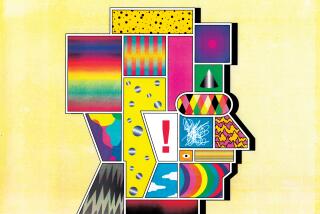Depression Therapy on PC: Dicey
- Share via
Feeling depressed? Why not talk it over with your computer?
Overcoming Depression, a $200 program for IBM PCs and compatibles, is intended to help “the 25% of the population who are depressed at some time in their lives.” The program combines a text-based tutorial with the opportunity for you to go through a free association session with the computer as therapist.
This isn’t the first time I’ve seen a program designed to help people overcome psychological problems, but the authors’ credentials, along with the price, prompted me to take a serious look.
Although the program can be educational and fun, I question its therapeutic value and worry that, for severely depressed people, it could even be dangerous.
The program’s content was written by Dr. Kenneth M. Colby, a professor of psychiatry and behavioral sciences at the UCLA School of Medicine.
The program, which Colby refers to as a tutorial, is organized into seven lessons: Negative Self-Comparisons in Depression, Mood Ratios and Value Dimensions, Ideal Standards, Reprogramming Yourself, Obstacles to Overcoming Depression, Changing Values, and Suicide and Antidepressant Medication.
Each lesson begins with information that explains the topic so the user can better understand depression and how it can be overcome.
Lesson 1 begins with an explanation of the program’s goals and explains that “it can help in the same way that books inform you about bad-back problems or controlling cholesterol.”
Several screens later, the program says it can give you “specific cognitive strategies and tactics for working your way out of your depression” through “explanations, instructions, examples and homework exercises.”
In this respect, the program is no different from a book or pamphlet. Colby, a recognized authority, is providing tips and information that may be of value.
After a few screens of text, however, the program asks three yes or no questions: “Do you feel sad frequently?” “Do you feel sad for days and weeks at a time?” and “Do you have a low opinion of yourself?”
Once you’ve answered the questions, it goes into a dialogue mode. In other words, you interact with the computer, just as if it were a real therapist. You are instructed to “express your thoughts and feelings in your own words.”
This part of the program can be fun, and it can even lead to insights. But if you weren’t crazy when you start using it, you’re likely to be driven there by the way the program responds.
The software, according to Colby, is able to comprehend about 30,000 words. If it recognizes the words you type, it responds in a way that its authors feel might be appropriate. But it makes lots of mistakes. I engaged the program in a discussion about being overweight. Although I’m not overweight now, the problem has haunted me in the past.
Here is the transcript of the dialogue.
Larry: I am upset because I am overweight.
Program: What makes you so upset with yourself?
Larry: I’m too fat.
Program: How come you are fat?
Larry: Because I eat too much.
Program: When you are upset, your appetite can increase or decrease, which I admit is not very useful information.
Larry: I know that.
Program: What else can you say about what you know in this regard?
Larry: I think I would feel better if I were thin.
Program: Why are you thin?
Larry: I’m not thin, I’m fat.
Program: Why aren’t you thin?
Larry: Forget it.
Program: We were talking about your depressed feelings. Please tell me more about them.
Larry: I can’t control my appetite.
Program: What makes you want to keep everything under control?
Larry: I don’t want to control everything, just my appetite.
Program: But perhaps you want to keep everything under control.
Larry: No, I don’t.
Program: A feeling of helplessness is common in depression. What are your ideas about helplessness?
It got worse. At one point the program asked me about my eating habits, and I said that I sometimes “binge.” The program associated “binge” with a drinking problem so it started asking irrelevant questions about drinking.
At another point, it asked me whether being overweight affected my sexual relations. I responded that I was married and that it didn’t seem to have much of an impact. The program asked me why I was so concerned about marriage. I can’t imagine a real therapist asking such an irrelevant question.
I wouldn’t mind the program if it were sold as a curiosity item. Nor would I object if it were presented purely as an experiment. But this program is priced and promoted as serious therapy. Its 15-page manual doesn’t even carry the usual disclosures and warnings about seeking professional help.
I would consider it a tragedy if a severely depressed person turned to this program instead of seeking help from a qualified professional. Colby, however, argues that “90% of the people with mental health problems never get to see a mental health professional because of the high cost and social stigma.”
Users “even like the program’s mistakes,” Colby said. “As a patient, the doctor is in control. Here you can laugh at its mistakes.”
Dr. Stuart Schwartz, professor of clinical psychiatry at Robert Wood Johnson Medical School, agrees that the tutorial part of the program “can be a good substitute for self-help books” but feels that the “interactive element is very suspect.”
Dr. Charles Walton, a Palo Alto-based psychiatrist, believes that the program could be useful in some cases but worries about it being used by severely depressed people.
“I can imagine patients who feel totally despairing and hopeless trying this and concluding that it proves their total failure and worthlessness,” Walton said.
Overcoming Depression is published by Malibu Artifactual Intelligence Works, 25307 Malibu Road, Malibu, Calif. 90265. Phone: 213 456-7787.


